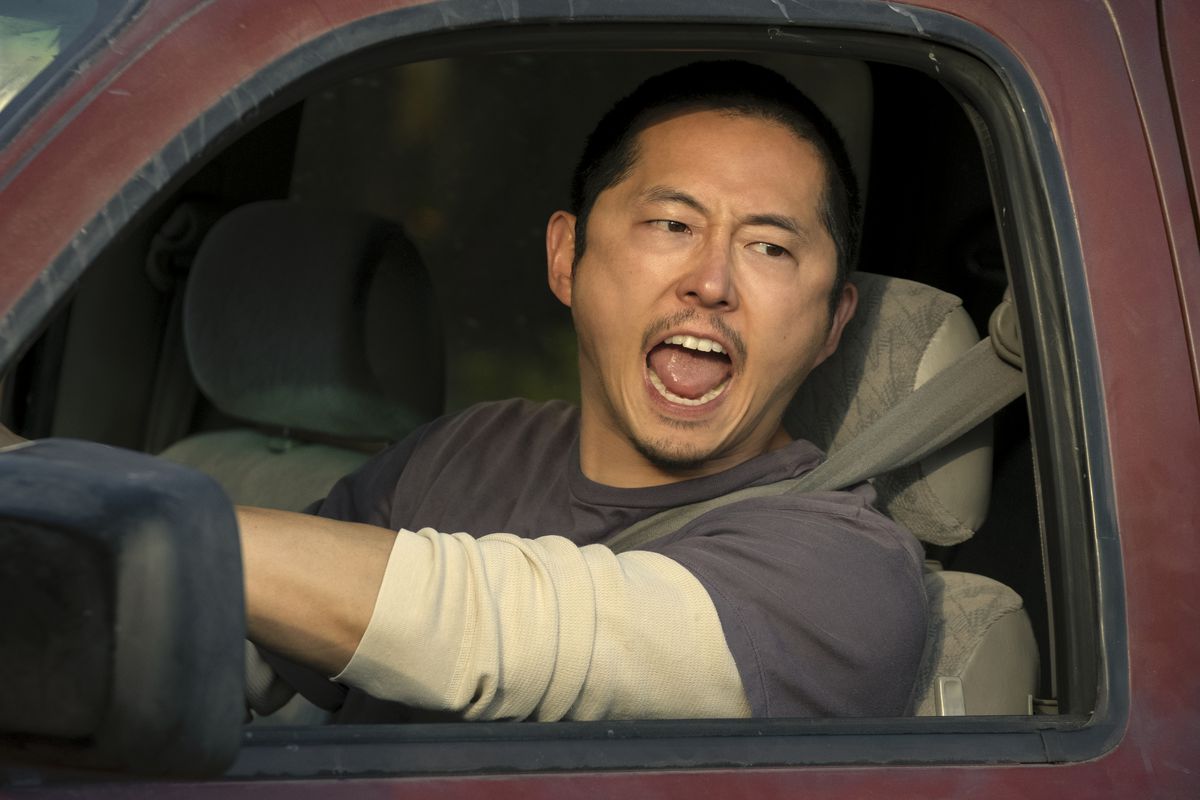The Netflix series Beef is a cataclysmic spiral of existential despair and self-destruction. It starts, however, with little more than a traffic altercation: Danny Cho (Steven Yeun) backs out of an LA parking lot in his crappy red truck and nearly hits a pristine white SUV. Horns are honked, words shouted, middle fingers extended. It’s the sort of conflict where the participants tend to go on with their lives once they’ve let off some steam.
But for Danny and the unseen SUV driver, there’s still quite a lot of steam to let off. Danny gives chase, weaving through red lights and stop signs while his adversary pelts his windshield with garbage. Once the confrontation is over and the SUV speeds away, we see that the driver is another Asian American: Amy Lau (Ali Wong), a harried entrepreneur on the verge of selling her thriving business for a huge payday.
The characters in Beef are not well-intentioned victims of circumstance who learn some sort of lesson by the end. They are allowed to be horrible and selfish and petty in ways that we rarely see outside white-centered stories, and their behavior takes on a fascinating additional layer in the context of the Asian American identity that unites them even across divisions of class and culture.
In essence, the series is an extreme interpretation of something Amy’s touchy-feely husband George (Joseph Lee) says: You never know what the other person is going through. Danny is a struggling handyman living out of the motel his family once owned with his layabout brother Paul (Young Mazino). George is right, in a sense, that Amy and Danny are thinking of the other only as a target for their ire rather than as a distinct person with their own life and feelings. Of course, he’s also ignoring the fact that Danny tracked Amy down in the aftermath, cajoled his way into her home, and maliciously peed all over her bathroom.

Beef gives its Asian Americans room to be anything but reserved and polite. We watch the imperfect coping mechanisms they’ve developed, like masturbating with a gun or inhaling a distressing amount of Burger King. And then we see how, in painting one another as an unambiguous enemy, they find an outlet for the emotions they’ve spent so much of their lives holding in.
When Danny comes home to the cramped room he shares with Paul, he rants about the expectation to take “other people’s shit” with a smile. It’s a quality that, as an actor, Steven Yeun has built a recent career on expressing: the buried hurt of his traumatized ex-child actor in Nope, the simmer of sociopathy in Burning. He conveys something more going on beneath the face he presents to the world. In Beef, Danny can’t be honest even when he’s otherwise being open about how he feels — he lies to his brother that he scared off the white SUV and “won” the confrontation, and he spends much of the series making tiny excuses as if by instinct. (“I did chest yesterday,” by way of explanation for being outlifted by the plainly more athletic Paul.)

In Amy, too, we see the things she must ignore and the performance she must give, which similarly dovetails with Ali Wong’s own career: She’s essentially struggling to keep burying her outspoken comic persona. Her interactions with Jordan (Maria Bello), the prospective buyer for her company, are loaded with casual racism that she smiles through, like when she’s praised for her “zen Buddhist” vibe. Amy sees the sale of her company as an escape from such soul-sucking maintenance, a way for her to cash out and focus on raising her young daughter. But even in her personal life, she goes unheard — George cuts her off before she can even explain the road rage incident.
On some level, the characters can trace repression back to their families. Amy says as much about her quiet Midwestern upbringing, whereas Danny notes that he, as the eldest son, shouldered the bulk of his parents’ demands. As in so many Asian American stories, the protagonists labor beneath a cloud of generational strife. But repression is as much heaped upon them through the societal stereotype of the model minority, the ones who keep their heads down and never make a fuss — the very behavior that Danny rages against in the first episode, and the very expectation that countless Asian Americans are confronted with throughout their lives.
As Beef’s conflict spirals out of control, it places its characters in a pantheon of TV antiheroes. The self-actualizing arc of its characters and the collateral damage they leave behind plays like a sort of low-stakes Breaking Bad, with the pettiness and discontent unobscured by any climactic drug-dealing drama. We understand Amy and Danny, perhaps even rooting for their success on occasion, and Beef accesses that empathy without needing to make them particularly likable or sympathetic. The series dismantles stereotypes by giving its characters such depth, revealing the humanity underneath. And humanity, Beef recognizes, is often messy, angry, and imperfect.
[embedded content]
The context of their actions and the legible history of pain that comes with it do not absolve them, and their more unsavory traits never subside. Danny’s interactions with Amy are pervaded by oblivious chauvinism, first imagining that only George could be his adversary and then labeling her a bored housewife leeching off her husband’s “art money.” And Amy, for her part, is hardly deterred by the vast income gap that divides her and Danny — she paints “I AM POOR” on the side of his truck and tanks the reviews for his floundering construction business. When she tracks him to his motel, she gloats that he did not strike her as a homeowner.
For as intense as the specific rivalry is here, there’s also a universal truth to their struggles, in the catharsis of expression. As Beef goes on, it demonstrates that Danny and Amy are far from the only characters beaten down by the weight of expectation. George is the son of a famous sculptor, but his own work displays none of the talent and makes no money, leaving Amy to provide for the family. Paul bemoans the way older generations pass off all their hangups and insecurities onto the next. They, too, are products of neglected emotion; when Amy and Danny manipulate them to their own ends, Paul and George taste some of the validation they’ve never clearly received from their own loved ones.
With the increase in on-screen representation over the years, Asian Americans have anchored previously unthinkable leading roles, as things like love interests and superheroes. It’s Beef, though, that clears a truly pivotal hurdle in that regard: It lets its protagonists and peripheral characters be messy and complex, if not unambiguous assholes.
- SEO Powered Content & PR Distribution. Get Amplified Today.
- Platoblockchain. Web3 Metaverse Intelligence. Knowledge Amplified. Access Here.
- Source: https://www.polygon.com/23683681/beef-netflix-season-1-review
- a
- About
- across
- Additional
- Against
- All
- allowed
- American
- Americans
- amount
- and tanks
- Andrew
- Another
- anyone
- Anything
- ARE
- as
- Asian
- At
- athletic
- BE
- Beef
- before
- behind
- built
- burger
- buried
- business
- buyer
- by
- CAN
- car
- Career
- Cash
- casual
- casual racism
- characters
- chase
- class
- clearly
- Cloud
- collateral
- Collateral Damage
- company
- complex
- conflict
- construction
- content
- context
- Control
- could
- course
- Culture
- damage
- demonstrates
- depth
- developed
- DID
- distinct
- divisions
- down
- Drama
- driver
- embedded
- emotions
- Empathy
- ends
- Entrepreneur
- essence
- Essentially
- explain
- explanation
- extreme
- Face
- families
- family
- fascinating
- First
- Focus
- For
- from
- Gaming
- gap
- George
- Giving
- going
- gun
- hand
- Have
- heads
- here
- history
- hits
- holding
- Home
- How
- HTTPS
- huge
- Humanity
- Identity
- in
- incident
- Income
- Increase
- interactions
- interests
- Is
- IT
- ITS
- jpg
- King
- LA
- labeling
- labor
- layer
- leading
- LEARN
- Level
- Life
- like
- Little
- lives
- living
- looking
- love
- maintenance
- make
- MAKES
- Making
- Middle
- minority
- model
- money
- more
- nearly
- Next
- notes
- of
- on
- One
- open
- Other
- own
- owned
- Pain
- painting
- pantheon
- parking
- part
- pass
- Paul
- performance
- persona
- personal
- pervaded
- pivotal
- places
- plato
- plato data intelligence
- platodata
- platogaming
- Polygon
- presents
- previously
- Products
- Provide
- quality
- quite
- racism
- raising
- rather
- received
- red
- representation
- reserved
- revealing
- Reviews
- right
- rivalry
- road
- roles
- room
- sale
- scared
- sees
- selling
- sense
- Series
- Shares
- shocked
- Signs
- So
- societal
- some
- something
- son
- specific
- Steam
- still
- Stories
- strike
- struggling
- success
- such
- superheroes
- Take
- Talent
- Target
- taste
- that
- The
- the world
- their
- Them
- things
- Thinking
- thriving
- Through
- Throughout
- to
- trace
- traffic
- truck
- truth
- tv
- Understand
- Universal
- unthinkable
- validation
- Vibe
- victims
- Watch
- way
- ways
- What
- while
- white
- WHO
- with
- words
- Work
- world
- years
- young
- youtube
- zephyrnet












